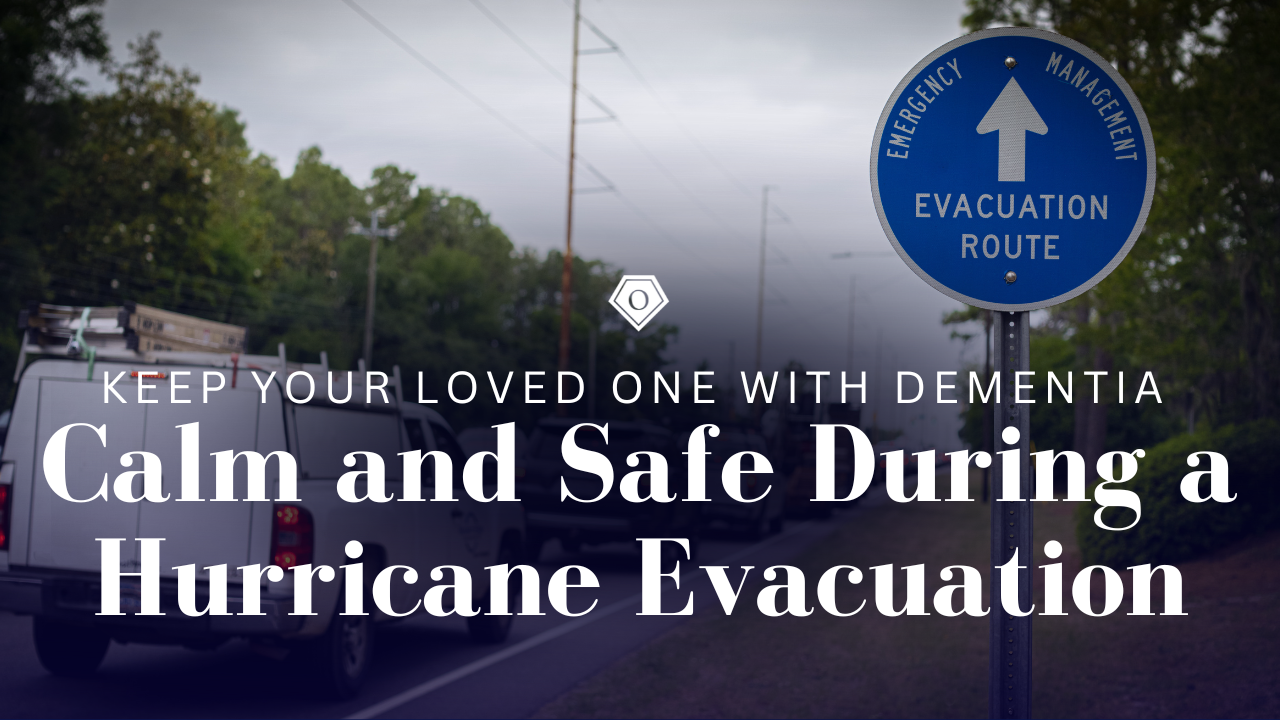When a hurricane strikes, there’s a whirlwind of activity—packing, preparing, and making sure everyone is safe. For families caring for a loved one with dementia or Alzheimer’s, the process becomes even more complex. Sudden changes, unfamiliar environments, and disruptions in routine can cause increased confuasion, anxiety, and fear for someone with cognitive impairments. As caregivers, managing their emotions becomes just as important as ensuring their physical safety. Here’s how to support your loved one emotionally during the evacuation process.
Prepare for Emotional Reactions
Evacuating can be a disorienting and frightening experience for anyone, but for someone with dementia, it can trigger heightened emotional responses. They may not understand why they must leave their home or what is happening. Common emotional reactions during evacuation include:
- Confusion: They may need clarification about where they are going or why things are changing.
- Anxiety: Unfamiliar surroundings and a break in routine can cause heightened anxiety or nervousness.
- Agitation: Your loved one may become easily upset or even angry due to the sudden disruption in their routine.
- Fear: Moving to a new place can create fear, particularly if they have difficulty understanding the situation.
Being prepared for these emotional reactions allows you to handle them with patience and care.
Maintain a Calm and Reassuring Demeanor
Your emotional state has a significant impact on your loved one’s mood. When you stay calm and composed, it helps to reduce their anxiety. Here are some ways to maintain a calming presence:
- Speak slowly and clearly: Use simple words and repeat information as needed. Short sentences like “We’re going somewhere safe” or “I’m here with you” can be reassuring.
- Use positive body language: A warm smile, gentle touch, or maintaining eye contact can provide comfort and reassurance.
- Avoid showing stress: It’s natural to feel stressed during an emergency, but try to shield your loved one from it. Take deep breaths, and project a calm, confident attitude.
Remember, your loved one may not fully understand the situation, but they will pick up on your emotions.
Use Familiar Objects and Routines
Familiarity provides comfort and security, especially for individuals with dementia. When evacuating, it’s helpful to bring along familiar items that can help your loved one feel more at ease:
- Pack comfort items: Whether it’s a favorite blanket, pillow, or family photo, these familiar objects can provide a sense of continuity in an unfamiliar setting.
- Stick to routines: Try to maintain regular meal times, medications, and daily routines as much as possible. This consistency can help reduce confusion and provide structure amidst the chaos.
Even small efforts to maintain a sense of normalcy can significantly help soothe your loved one’s anxiety.
Offer Constant Reassurance
During an evacuation, dementia patients may struggle to understand what’s happening. Reassure them frequently, even if it means repeating the same explanation:
- Use short, reassuring statements: Simple, comforting phrases like “We’re safe,” “I’m with you,“ or “Everything is okay“ can help ease their fears.
- Validate their feelings: If your loved one expresses anxiety or frustration, acknowledge those emotions by saying, “I understand you’re worried,“ or “It’s okay to feel upset.”
- Redirect attention: If your loved one becomes distressed, try redirecting their attention to something else, like listening to music, looking through a photo album, or engaging in light conversation.
Sometimes, the best way to reduce fear is to continuously remind them that they are safe and not alone.
Create a Quiet and Peaceful Environment
Evacuation shelters or temporary housing can be busy and loud environments, which may overwhelm someone with dementia. To minimize this, try to create a calm space wherever you are:
- Find a quiet spot: If possible, locate a quieter area in the shelter where your loved one can rest without being overstimulated by noise and crowds.
- Minimize overstimulation: Reduce loud sounds, bright lights, or fast-paced activity around your loved one. These can exacerbate agitation or confusion.
- Use soothing distractions: Soft music, familiar shows on a tablet, or reading to them in a calm tone can help divert their focus from the chaos around them.
A peaceful environment can work wonders in reducing stress for someone with dementia during an emergency.
Plan for Wandering and Safety Concerns
During a hurricane evacuation, the risk of wandering or getting lost may increase due to unfamiliar surroundings and confusion. Here are some ways to ensure your loved one’s safety:
- Use identification: Have your loved one wear a medical ID bracelet with their name, diagnosis, and your contact information. This is crucial if you are separated or if they wander off.
- Stay by their side: Keep a close watch on your loved one, as their confusion and anxiety may cause them to try and leave the area in search of “home.”
- Prepare staff or shelter personnel: If you’re in a public shelter, notify the staff or volunteers about your loved one’s condition so they can assist if needed.
You can help prevent wandering and keep your loved one safe during an evacuation by staying vigilant.
Practice Patience and Flexibility
Evacuating with someone who has dementia is not easy, and things may not always go according to plan. Be prepared to adapt and take things one step at a time:
- Expect the unexpected: Your loved one’s mood or behavior may shift unpredictably, so be prepared to handle changes with patience.
- Take breaks: If you’re feeling overwhelmed, taking a moment for yourself is okay. A deep breath or a quick break can help you reset and continue providing the care your loved one needs.
Patience, flexibility, and a calm demeanor will go a long way in managing your loved one’s emotions during this challenging time.
Emotional Care Is Just as Important as Physical Care
During a hurricane evacuation, your primary concern may be your loved one’s physical safety, but their emotional well-being is just as crucial. By staying calm, offering reassurance, and maintaining as much familiarity as possible, you can help soothe their anxiety and fear. As always, our home health care team is here to provide guidance and support. Don’t hesitate to reach out if you need assistance before, during, or after an evacuation.
Alzheimer’s and Dementia Care
Onyx Home Care’s neurological disorder care is built around a system of support. This service includes skilled home care as well as a unique program that centers on the patient’s interests and stage of illness. Our goal is to see happy family members, patients and caregivers. Often times, caregivers feel remote. Our team includes each person in the home care process to provide inclusive care that helps the patient thrive.






